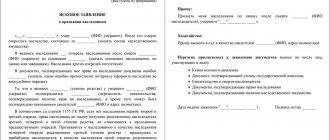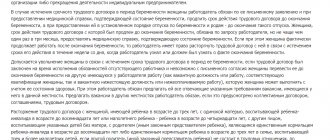An employee can be dismissed while undergoing treatment only at his own request. The employer cannot cut him or fire him for absenteeism, even if the employee is sick for a long time and often.
The type of sick leave does not matter: he can be in a hospital, in a sanatorium, recovering at home, or caring for a sick child. For such a period, a person is released from performing duties in his position and his job is retained.
How long is it allowed to stay on the base camp without losing your place?
The period of exemption from official duties is determined by the attending physician . It is indicated on the certificate of incapacity for work, issued in accordance with Order No. 624n of the Ministry of Health and Social Development of Russia dated June 29, 2011 (hereinafter referred to as Order No. 624n). Labor legislation does not limit the number of days during which a person can undergo treatment.
When a company is liquidated or an entrepreneur ceases to operate, an employee may be fired, even if he is on sick leave - this is an exception. But in these cases, the duration of treatment still does not matter.
Can a person who often goes on sick leave be fired?
When a subordinate is on paid sick leave for a long time, the employer does not know what is best to do. Usually, all attempts to appeal to conscience, make a reprimand, or dismiss are nipped in the bud due to the elementary absence of a citizen from his workplace.
In such a situation, the Labor Code categorically prohibits the application of any sanctions in relation to a specific subject.
Citizens who have temporarily lost their ability to work can exercise their right to sick leave. This document confirms the legal reason for absence from work. However, it is often very difficult to find out whether a subordinate was really sick or whether the certificate of incapacity for work is a simple cover for personal matters.
This is important to know: Is the army included in the length of service for sick leave?
Employers are especially often concerned about cases when an employee goes on sick leave quite often or his illness is prolonged. You should not torment yourself with suspicions and doubts, but simply study the regulatory framework of the issue and know effective ways that will help verify the authenticity of a sick leave certificate issued by a medical institution.
The Labor Code of the Russian Federation provides for the possibility of terminating an employment contract in the event of absence from work for more than four months in a row due to temporary incapacity for work (this does not include maternity leave), unless current legislation establishes a longer period for maintaining a job in case of a certain illness.
So can you fire someone for taking frequent sick leave to care for a child?
If an employee is absent from his workplace due to caring for a sick family member, then management does not have the right to dismiss such a subordinate. Among other things, there are certain guarantees for representatives of the fairer sex raising minor children.
If the contract with the company ends before the employee's youngest child reaches the age of five, management must enter into a new contract for at least twelve months.
Do they have the right to expel a person if he constantly takes BC or is sick for a long time?
Regarding whether an employer can get rid of an employee who is often or for a long time ill: the law does not limit how many sick leaves a person can take out and how long he does not go to work because of this. An employer may be dissatisfied that a person is often sick, but the rules of the Labor Code prohibit the dismissal of a sick employee (Part 6, Article 81 of the Labor Code of the Russian Federation).
The law provides two grounds when an employee’s health condition is grounds for termination of employment:
- According to clause 8, part 1, art. 77 of the Labor Code of the Russian Federation, employees who cannot be transferred to another job necessary for health reasons are dismissed. To be dismissed in this case you must:
- Medical report on health status with contraindications for the work performed. If an employee has been diagnosed with a disability of group II or III, he must bring an IPR - an individual rehabilitation program for a disabled person, which will contain recommendations for work.
- The employee’s refusal to transfer to another position or the employer’s lack of a suitable position (Parts 3 and 4 of Article 73 of the Labor Code of the Russian Federation).
- According to clause 5, part 1, art. 81 of the Labor Code of the Russian Federation, employees who have received a disability of the first degree are dismissed (Clause 5, Part 1, Article 81 of the Labor Code of the Russian Federation). It is believed that in this case the employment contract is terminated regardless of the will of the parties. In these cases, workers are entitled to severance pay in the amount of average earnings for two weeks (Article 178 of the Labor Code of the Russian Federation).
In other cases, except for the liquidation of a company or termination of the activities of an individual entrepreneur, an employee’s illness cannot be grounds for termination of employment.
Reality and practice
Current legislation directly states that frequent illness of an employee cannot be a reason for dismissal.
In this case, the reasons that led to the onset of the period of incapacity do not matter. An employee may be sick himself or absent due to the need to care for a child or family member who is in a difficult situation and requires constant supervision. In practice, the situation of an employee’s absence and the impossibility of carrying out work activities in most cases is perceived negatively by the employer, and he may decide to dismiss. The order will not contain direct wording and will indicate other reasons, which are not so difficult to find if desired. This could be a violation of labor discipline, tardiness, inadequacy for the position held, and many other circumstances.
In theory, in case of illegal dismissal, an individual has the right to go to court to carry out the procedure for reinstatement at the place of employment. For the employer, this development of events is fraught with the following consequences:
- financial liability - the employee is reimbursed his average earnings for the period of forced inability to work and may be paid monetary compensation for moral damage caused by illegal dismissal;
- administrative liability - a fine is imposed for violation of legislation in the field of labor relations.
In case of unjustified dismissal of a pregnant woman or a woman raising three or more children, the head of the organization may be subject to criminal liability in the form of paying a fine or performing compulsory work.
In practice, it can be quite difficult to prove the illegality of dismissal, so it is recommended to focus efforts on eliminating the situation of frequent illnesses with loss of ability to work. The current norms of the Labor Code do not provide for the possibility of dismissal due to frequent illness. In practice, many employers suffer losses due to long-term absence of an employee due to illness and find other reasons for dismissal. Due to the frequent provision of certificates of incapacity for work, they cannot be fired, and in such a situation it is possible to assert rights in court.
Time limits for an employee to remain on the ballot
Paragraph 11 of Order No. 624n determines that a certificate of temporary incapacity for work is issued for a period not exceeding 15 calendar days . If after the specified time the person has not been cured, he is sent to a medical commission. In such cases, sick leave can be extended to 10 months.
The period of exemption from work can be increased to a year if a person suffers from tuberculosis, is recovering from surgery, or has received a serious injury (Part 3.p. 13 of Order No. 624n). The patient will need to go to the doctor to evaluate the condition and extend the sick leave every 15 days.
If treatment does not bring results and the prognosis is unfavorable, then the patient is sent for a medical and social examination within 4 months and may be recognized as disabled.
If the patient refuses to undergo a medical and social examination with an unfavorable prognosis, the sick leave will be closed (clause 4 of Article 59 of the Federal Law of November 21, 2011 No. 323-FZ “On the fundamentals of protecting the health of citizens of the Russian Federation”).
Separate rules are established for persons with a working disability group . According to paragraph 3 of Art. 6 of the Federal Law of December 29, 2006 No. 255-FZ “On compulsory social insurance in case of temporary disability and in connection with maternity”, benefits to such employees are paid for no more than 4 months continuously or 5 months in total during the year.
This limitation is due to the fact that they receive a disability pension. Regardless of the status, the maximum duration of treatment is determined by the commission individually in each specific case.
How to legally fire a frequently ill employee?
When dismissing a subordinate, the employer may face unpleasant consequences of his actions, for example:
- even if the employee was dismissed legally, he has the right to file a complaint with the labor inspectorate. If, when checking the correctness of dismissal, errors are revealed in the preparation of employment documents (orders, work book), then a large fine will be imposed on the employer;
- if the salary was paid to a subordinate in an envelope and the employee was not officially registered at his workplace, then he has the right to file a complaint. In the case when the information specified by the subject is confirmed and sent to the tax service, the Pension Fund and the Social Insurance Fund, the authorities may face new taxes, insurance premiums, and fines.
Persons who systematically go on sick leave are not always able to fully perform their main job responsibilities, which can negatively affect the performance of the entire company. There are often unscrupulous subordinates who use their right to sick leave for other than its intended purpose.
In such difficult situations, management has to look for legal ways to solve the problem and in most cases the only way out is dismissal. Previously, the current legislation had a provision allowing for separation from a subordinate who has been ill for more than four months.
At the moment, there is an amendment to the Labor Code that termination of an employment contract during illness is strictly prohibited if the initiative comes only from the employer. In this case, the latter has to prove the fact that the particular subject was not ill while on sick leave.
In a situation where a citizen brings a fake certificate of incapacity to work to his management, a disciplinary sanction in the form of dismissal may be applied. It is important to follow the entire procedure in accordance with the basic requirements. So how to fire an employee who is constantly on sick leave?
In addition to the employer’s initiative, the Labor Code contains other possibilities for terminating an employment contract, which are not prohibited during the illness of the subject, they are as follows:
- At the moment, one of the most common grounds is the initiative of a subordinate. A person must write a letter of resignation of his own free will;
- management has the right to terminate the employment contract with the subject by agreement of the parties. In this case, both parties can fix all the conditions for terminating the contract, including reaching a general consensus regarding compensation payments for the subordinate;
- expiration of the employment contract. For this reason, sick leave is not an obstacle. This is due to the fact that these circumstances do not depend on the parties;
- the citizen refuses to continue working in working conditions that have changed slightly. If you offer a subject a change in the terms of the employment contract with which he does not agree, and the management does not have any other work for him, then you can terminate the employment relationship even in the event of a person’s temporary incapacity for work. However, it is important to act in accordance with the law.
What should an employee do in case of illegal dismissal, where to turn?
In the event of illegal termination of employment, the employee has the right to file a complaint with the authorized official authorities. These include:
- Rostrud (available through the portal “Onlineinspektsiya.rf”).
- Prosecutor's office (available through the State Services portal).
- Court.
Regardless of where the employee applies, he must file a complaint. The text should reflect the following information:
- The name and address of the organization the employee is applying to.
- Information about the employer.
- Applicant details, including position.
- Start and termination dates of the employment relationship.
- Grounds for dismissal.
- Applicant's requirements.
- List of attached documents.
- Date and signature.
So, employees, if they want, have the right to demand reinstatement at work, or compensation for the time of forced absence.
You can learn more about the dismissal procedure and certificates of incapacity for work from individual articles by our experts. Read about payment for BL during vacation followed by dismissal and after vacating a position, about whether it is possible to take sick leave on the day of termination of an employment contract and how to apply for an extension, about whether BL is required for child care after dismissal, and also about Is it possible to go on sick leave with dismissal without working, is this time included in the two-week period and how does this procedure work?
General information
The Social Insurance Fund is the main source of funds for sick leave compensation. Employers pay a certain amount into this Fund, depending on the size of the standard remuneration of a particular employee.
This is important to know: How to get sick leave during pregnancy
A sick leave certificate is proof of the employee’s incapacity for work.
Dismissal during sick leave is unacceptable even for those subordinates who have signed temporary employment contracts. In such cases, the procedure is organized only after the citizen returns to his place. Usually this is the day after the official expiration of the sick leave itself.
Situations often occur when management issues one or more absences to an absent employee. For example, when it is impossible to get in touch with a subordinate. Or when he is in intensive care, unconscious.
To avoid such situations, the manager is recommended to take contact information from relatives and other persons who are in close relationships with the citizen.
For both parties, there are several options for behavior in the event of an unexpected illness:
- Independent revocation of the order and restoration of the workplace. Similar actions are performed by the leader. This situation does not entail any additional sanctions; you don’t have to worry about this.
- Appeal to court by an employee. This is relevant when dismissal occurs due to a prolonged lack of information. And when upon the citizen’s return there was no reinstatement. The manager will be obliged to compensate for moral damage, as well as the sick leave itself. Forced absenteeism presupposes the preservation of average earnings. It is impossible to do without fulfilling the request to reinstate the citizen in his position.
The manager must use all available methods to obtain information regarding the reasons for absence from work.
Sick leave in most cases is paid from the appropriate social insurance fund. The employer must pay for the first three days in accordance with current legislation. The specific size depends on length of service in the organization. The higher it is, the greater the compensation.
Can you be fired for frequent sick leave?
Exceptional circumstances must exist for such a decision to be made. Eg:
- Liquidation of the enterprise, official closure of the individual entrepreneur. Then the employee must receive all the funds that are due to him. We are talking about compensation due to unused vacations, deductions for sick leave, and severance pay.
- When the employee himself expresses his will in this matter. Citizens have the right to leave the workplace at any convenient time. It is enough to write an application in advance. Then you will need to transfer compensation for vacations and sick leave. In this case, it becomes necessary to work for two weeks. But having the appropriate documents will allow you to spend two weeks only on sick leave.

To fire an employee you need a good reason
Liquidation of an organization and reduction of staff are concepts that are clearly separated in current legislation. If it is necessary to reduce staff, you cannot fire employees who have taken leave for temporary disability. Dismissal takes place only after the citizen officially returns to work and when appropriate measures have taken place, such as studying dismissal orders, providing the opportunity to choose another vacancy, and so on.






